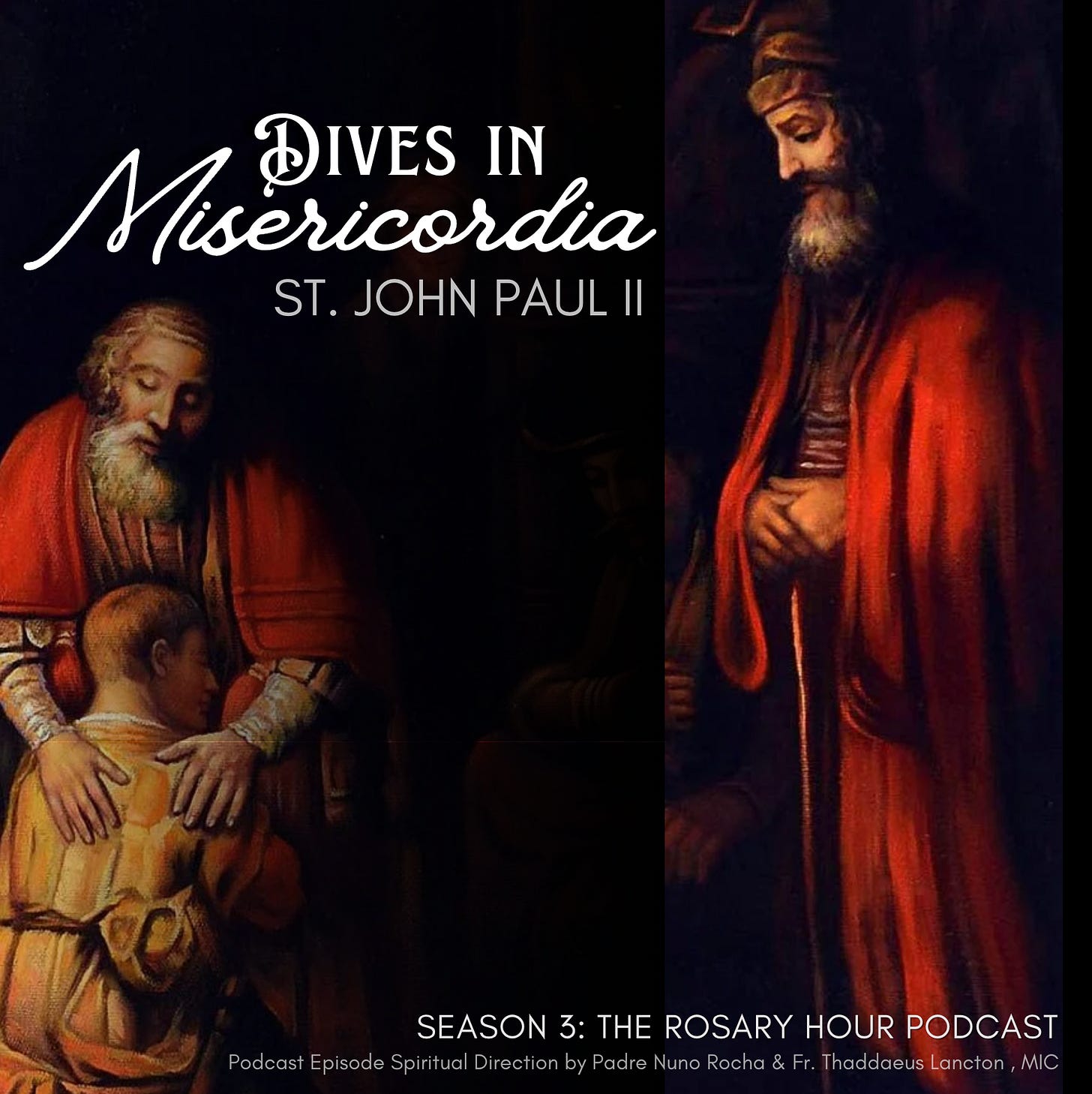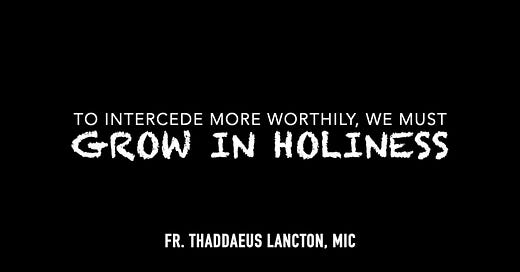Hail, white lily of the ever-peaceful and glorious Trinity!
Hail, effulgent rose, the delight of heaven, of whom the King of heaven was born, and by whose milk He was nourished ! do thou feed our souls by the effusions of thy Divine influences."
(St. Gertrude, “Revelations”)1
We remember today St. Francisco Marto began his journey into Eternal Life in Aljustrel at 10:00 p.m. on April 4, 1919. His body was buried in the cemetery of Fátima and later transferred to the Basilica on March 13, 1952. His great concern was to "consoling Our Lord". His spirit of love and prayers for the offended God were remarkable in his short life. He spent hours "thinking about God". He was a contemplative who was born in Aljustrel, Fátima, on June 11, 1908. He was baptized on June 20, 1908. He fell ill with pneumonia in December 1918.2
THE ROSARY HOUR PODCAST NEWSLETTER | APRIL 4, 2025 (2nd Edition)
To those who are called, to those who are dear to God the Father and kept safe for Jesus Christ, wishing you all mercy and peace and love:
FIRST FRIDAY3 DEVOTION WITH THE MARIAN FATHERS JUST STARTED: 8 PM TONIGHT — In this Livestream Fr. Chris Alar reviews the “Special Prayers for Reparation to the Sacred Heart of Jesus” in this event and he is currently going through all twelve promises of the First Friday Devotion for the first time. Watch live or review the replay below:
Our Lord made the following promises to St. Margaret Mary Alacoque in France regarding those who practice the Nine First Fridays and have a deep devotion to Our Lord’s Sacred Heart.
The Twelve Promises listed below include the “Great Promise”.
1. I will give them all of the graces necessary for their state of life.
2. I will establish peace in their homes.
3. I will comfort them in all their afflictions.
4. I will be their strength during life and above all during death.
5. I will bestow a large blessing upon all their undertakings.
6. Sinners shall find in My Heart the source and the infinite ocean of mercy.
7. Tepid souls shall grow fervent.
8. Fervent souls shall quickly mount to high perfection.
9. I will bless every place where a picture of my heart shall be set up and honored.
10. I will give to priests the gift of touching the most hardened hearts.
11. Those who shall promote this devotion shall have their names written in My Heart, never to be blotted out.
12. I promise you in the excessive mercy of My Heart that My all-powerful love will grant all to those who communicate on the First Friday in nine consecutive months the grace of final penitence; they shall not die in My disgrace nor without receiving their sacraments; My Divine Heart shall be their safe refuge in this last moment.
Pray the Sorrowful Mysteries before retiring.
Here is a prayer card.
PRAYERS OF REPARATION: CONSOLING THE AGONY OF JESUS CHRIST
Throughout history, Christ has been leading humanity back to the Almighty Father — and as we celebrated this week the 2nd of April and pondered the writings of St. Pope John Paul II (born May 18, 1920, Wadowice, Poland—and who entered into eternal life on April 2, 2005, Vatican City, and was beatified May 1, 2011; canonized April 27, 2014), we might also take time to rediscover the Encyclical “DIVES IN MISERICORDIA” as we prepare to approach Divine Mercy Sunday — and the Canonization of Carlo Acutis on April 27 in 2025.

SEE: “DIVES IN MISERICORDIA” & THE PARABLE OF THE PRODIGAL SON
REDISCOVER THIS TEXT in ENGLISH: https://www.vatican.va/content/john-paul-ii/en/encyclicals/documents/hf_jp-ii_enc_30111980_dives-in-misericordia.html
LER + em PORTUGUÊS: https://www.vatican.va/content/paul-vi/pt/apost_constitutions/documents/hf_p-vi_apc_01011967_indulgentiarum-doctrina.html
LIRE + EN FRANÇAIS: https://www.vatican.va/content/john-paul-ii/fr/encyclicals/documents/hf_jp-ii_enc_30111980_dives-in-misericordia.html
APRIL NEWSLETTER: FIRST FRIDAY AND FIRST SATURDAY REMINDERS
In this post, we share the “O Blood and Water” prayer which can be added to the beginning of the CHAPLET TO THE DIVINE MERCY, or recited at the 3 o’clock hour of Mercy as will be PRAYED ON RADIO MARIA BY ZOSIA AND AMELIA https://radiomaria.us this coming Saturday, 12 April 2025 during a Holy Hour with Children’s Rosary.
While a later post will share some notes from Fr. Nuno’s novena with music sung to honour the agony of Christ, as highlighted in this presentation, please take time to pray in the coming days the Stations of the Cross, using the following link to start your journey as a Pilgrim of Hope:
Which Saint do we celebrate April 5th who cured lepers and raised the dead to life?
Tomorrow’s Saint helps us focus on exploring “Resurrection” as remember St. Vincent Ferrer:
Many were the signs and miracles which God wrought through him, in confirmation of the holiness of his life and preaching. He very frequently restored the sick to health, by placing his hands upon them. He drove out the unclean spirits from the bodies of such as were possessed. He gave hearing to the deaf, speech to the dumb, sight to the blind. He cured lepers, and raised the dead to life. At length, worn out by old age and bodily infirmities, after travelling through many countries of Europe, and reaping an abundant harvest of souls, this untiring herald of the Gospel terminated his preaching and life at Vannes, in Brittany, in the year of Our Lord 1419. He was canonized by Pope Callistus III.
Often referred to as the Apostle of the Final Judgement4, we pray to him April 5th, 2025 which falls on First Saturday. Fr. Lancton helps us revisit the concept of plenary indulgences, which we invite you to share with others in the coming weeks as we begin thinking more deeply about reparative devotions that might change the course of history like those focused on consoling the Sacred Heart of Jesus and the Immaculate Heart of Mary, and renew our understanding of the Divine Mercy during Lent.
We invite you to read St. Vincent Ferrer’s “Treatise on the Spiritual Life” (cc. 1-3) below5:
HOW DO I TAKE ADVANTAGE OF THE CHURCH’S TREASURY OF MERIT?
According to a summary by B.C. Catholic:
“The Church teaches that this “remission” is done by the authority that Jesus Himself gave to it in Matthew 16:19: “I will give you the keys of the kingdom of heaven … whatever you bind on earth shall be bound in heaven … whatever you loose on earth shall be loosed in heaven” [also Mat 18:18]. By this authority to “bind and loose,” the Church is able to draw on the great treasury of rewards/merits that have been won for us by Jesus’ sacrifice on the cross [and by the merits gained by the saints as well, united with Jesus’ sacrifice, CCC 1475-77].”
Today’s 1st Edition Live Record on Plenary Indulgences reminds readers how to take advantage of many opportunities during Jubilee 20256, one of which Fr. Thaddaeus Lancton explained a few presentations back, as the “Vatican Apostolic Penitentiary” that “deals with granting indulgences” has decreed that during this special time:
“[T]he faithful who have carried out an act of charity on behalf of the souls in Purgatory, if they receive Holy Communion a second time that day, can obtain the plenary indulgence twice on the same day, applicable only to the deceased (this must take place within a Eucharistic celebration …)” (Pronchen, “Help Holy Souls in Purgatory With a Double Plenary Indulgence This Jubilee 2025”, National Catholic Register).
Further, we might reflect on St. Faustina’s message prior to Divine Mercy Sunday:
“I desire that the Feast of Mercy be a refuge and shelter for all souls, and especially for poor sinners. On that day the very depths of My tender mercy are open. I pour out a whole ocean of graces upon those souls who approach the Fount of My Mercy. The soul that will go to Confession and receive Holy Communion shall obtain complete forgiveness of sins and punishment. On that day all the divine floodgates through which graces flow are opened. Let no soul fear to draw near to Me, even though its sins be as scarlet” (Diary of St. Faustina, Entry #699).
In the coming posts, we’ll review Divine Mercy Sunday. Review with Fr. Anthony’s discussion on how “Divine Mercy is the Gateway to Heaven” here:
QUICK REVIEW OF THE DOCTRINE & PRACTICE OF INDULGENCES
Section 1471 of the Catechism of the Catholic Church states that
“The doctrine and practice of indulgences in the Church are closely linked to the effects of the sacrament of Penance.”
«What is an indulgence? »
"An indulgence is a remission before God of the temporal punishment due to sins whose guilt has already been forgiven, which the faithful Christian who is duly disposed gains under certain prescribed conditions through the action of the Church which, as the minister of redemption, dispenses and applies with authority the treasury of the satisfactions of Christ and the saints."«What is the difference? PARTIAL versus PLENARY?»
"An indulgence is partial or plenary according as it removes either part or all of the temporal punishment due to sin."NOTE WELL:
«Indulgences may be applied to the living or the dead.»
On “The punishments of sin”, CCC 1472
“To understand this doctrine and practice of the Church, it is necessary to understand that sin has a double consequence.
Grave sin deprives us of communion with God and therefore makes us incapable of eternal life, the privation of which is called the "eternal punishment" of sin.
On the other hand every sin, even venial, entails an unhealthy attachment to creatures, which must be purified either here on earth, or after death in the state called Purgatory.
This purification frees one from what is called the "temporal punishment" of sin. These two punishments must not be conceived of as a kind of vengeance inflicted by God from without, but as following from the very nature of sin. A conversion which proceeds from a fervent charity can attain the complete purification of the sinner in such a way that no punishment would remain.
«“PENANCE, PENANCE, PENANCE”», CCC 1473
The forgiveness of sin and restoration of communion with God entail the remission of the eternal punishment of sin, but temporal punishment of sin remains. While patiently bearing sufferings and trials of all kinds and, when the day comes, serenely facing death, the Christian must strive to accept this temporal punishment of sin as a grace. He should strive by works of mercy and charity, as well as by prayer and the various practices of penance, to put off completely the "old man" and to put on the "new man.”
«The Communion of Saints»
1474 The Christian who seeks to purify himself of his sin and to become holy with the help of God's grace is not alone.
"The life of each of God's children is joined in Christ and through Christ in a wonderful way to the life of all the other Christian brethren in the supernatural unity of the Mystical Body of Christ, as in a single mystical person."
1475 In the communion of saints,
"a perennial link of charity exists between the faithful who have already reached their heavenly home, those who are expiating their sins in purgatory and those who are still pilgrims on earth. between them there is, too, an abundant exchange of all good things."
In this wonderful exchange, the holiness of one profits others, well beyond the harm that the sin of one could cause others. Thus recourse to the communion of saints lets the contrite sinner be more promptly and efficaciously purified of the punishments for sin.
1476 We also call these spiritual goods of the communion of saints the Church's treasury, which is
"not the sum total of the material goods which have accumulated during the course of the centuries. On the contrary the 'treasury of the Church' is the infinite value, which can never be exhausted, which Christ's merits have before God. They were offered so that the whole of mankind could be set free from sin and attain communion with the Father. In Christ, the Redeemer himself, the satisfactions and merits of his Redemption exist and find their efficacy.”
1477
"This treasury includes as well the prayers and good works of the Blessed Virgin Mary.
They are truly immense, unfathomable, and even pristine in their value before God. In the treasury, too, are the prayers and good works of all the saints, all those who have followed in the footsteps of Christ the Lord and by his grace have made their lives holy and carried out the mission the Father entrusted to them. In this way they attained their own salvation and at the same time cooperated in saving their brothers in the unity of the Mystical Body.”
«On Obtaining indulgence from God through 'treasury of the Church' (1478, etc).»
“An indulgence is obtained through the Church who, by virtue of the power of binding and loosing granted her by Christ Jesus, intervenes in favor of individual Christians and opens for them the treasury of the merits of Christ and the saints to obtain from the Father of mercies the remission of the temporal punishments due for their sins. Thus the Church does not want simply to come to the aid of these Christians, but also to spur them to works of devotion, penance, and charity.”
Also: 1479 states —
“Since the faithful departed now being purified are also members of the same communion of saints, one way we can help them is to obtain indulgences for them, so that the temporal punishments due for their sins may be remitted.”
We invite you to see Fr. Thad Lancton’s video Live Record on our “ROSARY” channel to learn more about this opportunity to obtain plenary indulgences for the Holy Souls in Purgatory.
«RECAP: CONDITIONS FOR OBTAINING A PLENARY INDULGENCE»
The Church has these conditions for a plenary indulgence to be granted as per Indulgentiarum doctrina, norm 7:
- Be in a state of grace when the indulgenced work is completed;
- Have the interior disposition of complete detachment from sin, even venial sin;
- Have sacramentally confessed one’s sins;
- Receive the Holy Eucharist;
- Pray for the intentions of the Pope.
REMINDERS:
We are also reminded that, “the Church also adds some extra clarification to some of these conditions”:
A plenary indulgence can only be acquired once per day (ID, norm 6).
One may make a sacramental Confession and receive Holy Communion “within several days before or after the prescribed work” (ID, norm 8).
One sacramental Confession can satisfy the requirement for several plenary indulgences, but separate receptions of Holy Communion and prayers for the Holy Father are required for each plenary indulgence (ID, norm 9).
An Our Father and a Hail Mary are suggested prayers for the Pope’s intentions (ID, norm 10).
Indulgences can either be applied to oneself or to the souls of the deceased, but not to other living persons (ID, norm 3).
It is worth noting that some indulgences can only be applied to the souls of the faithful departed, like the ones offered by the Church in early November for the Commemoration of the Faithful Departed (All Souls), or a second Holy Communion as put forth by the May 13, 2024 Jubilee Indulgence Decree.
COMING SOON: DEFINITION OF CONSCIENCE led by Fr. Lancton via our YOUTUBE CHANNEL on the ROSARY:
FOOTNOTES
In her revelations, St. Gertrude was told by Our Lord:
“Honour My Mother, who is seated at My side, and employ yourself in praising her."
Then the Saint began to salute the Queen of heaven, reciting the verse, Paradise of delights; and extolling her because she was the abode full of delights which the impenetrable wisdom of God, who knows all creatures perfectly, had chosen for His dwelling; and she besought her to obtain for her a heart adorned with so many virtues that God might take pleasure in dwelling therein. Then the Blessed Virgin inclined towards her, and planted in her heart the different flowers of virtue the rose of charity, the lily of chastity, the violet of humility, the flexibility of obedience, and many other gifts; thus showing how promptly she assists those who invoke her assistance.”
And… Then the Blessed Virgin made known to her that “if any one salutes her devoutly as the white lily of the Trinity and the vermilion rose of heaven, she will show her how she prevails by the omnipotence of the Father, how skilful she is in procuring the salvation of men by the wisdom of the Son, and with what an exceeding love her heart is filled by the charity of the Holy Ghost. The Blessed Virgin added these words :
I will appear at the hour of death to those who salute me thus in such glory,
that they will anticipate the very joys of heaven." From this time the Saint frequently saluted the Holy Virgin or her images with these words :
Hail, white lily of the ever-peaceful and glorious Trinity!
Hail, effulgent rose, the delight of heaven, of whom the King of heaven was born, and by whose milk He was nourished ! do thou feed our souls by the effusions of thy Divine influences."
https://www.vatican.va/news_services/liturgy/saints/ns_lit_doc_20000721_beat-francisco_po.html
“At the end of the 17th century Our Lord appeared to St. Margaret Mary Alocoque (1647-1690) and asked her to spread devotion to His Most Sacred Heart. In a letter written to her Mother Superior in May 1688, St. Margaret Mary set out what is called The Great Promise Our Lord made regarding the Nine First Fridays” and what we must do to earn it:
“On Friday during Holy Communion, He said these words to His unworthy slave, if I mistake not: ‘I promise you in the excessive mercy of My Heart that Its all-powerful love will grant to all those who receive Holy Communion on nine first Fridays of consecutive months the grace of final repentance; they will not die under My displeasure or without receiving their sacraments, My divine Heart making Itself their assured refuge at the last moment.'”
According to a number of resources, the First Friday requirements are “To meet the requirements for the First Friday Devotion” and “a person must, on each First Friday for nine consecutive months:
1. Attend Holy Mass
2. Receive Communion
3. Go to Confession
NOTE: The communicant should “have the intention, at least implicitly, of making reparation to the Sacred Heart of Jesus for all the sinfulness and ingratitude of men”.
On Judgment Day, every man will be judged and recompensed for each of his thoughts, words, and deeds, whether good or evil.
“For we must all appear before the Judgment Seat of Christ, that each one may be recompensed for his deeds in the body, according to what he has done, whether good or bad.” (2 Cor 5:10)
“[E]ach will receive his own reward according to his own labor.” (1 Cor 3:8)
“With good will render service, as to the Lord, and not to men, knowing that whatever good thing each one does, this he will receive back from the Lord, whether slave or free.” (Eph 6:8-9)
“I will give to each one of you according to your deeds.” (Rev 2:23)
“[L]et the one who is righteous, still practice righteousness; and let the one who is holy, still keep himself holy. Behold, I am coming quickly, and My reward is with Me, to render to every man according to what he has done.” (Rev 22:11-12)
Cited from:
READ MORE ABOUT ST. VINCENT FERRER’S LIFE:
https://www.fisheaters.com/srpdf/StVincentFerrerHisLife.pdf













Share this post